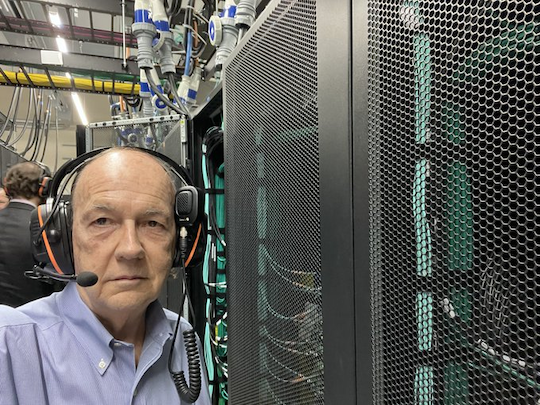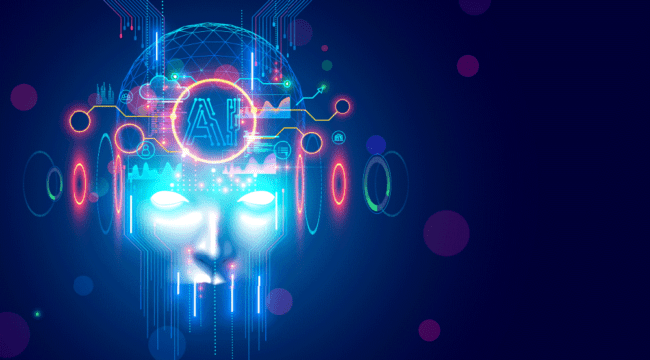Should You Fear AI?
Artificial intelligence (AI) is all the rage these days.
You can’t read headlines or turn on the news without hearing about how machines with vast computing power, access to billions of books and documents, the ability to teach themselves and blinding processing speeds are now poised to take over the world.
Last night, Fox News host Tucker Carlson even had an in-depth conversation about AI with Elon Musk. Musk didn’t have an optimistic take.
I’ve been studying AI and its potential for years.
I recently spent a couple of days visiting with the world’s third-fastest non-government supercomputer as part of a project to apply generalized superintelligence and AI to national security tasks.

How advanced is AI getting? How close is it to approaching a rough parity with human intelligence? And what dangers does it pose to humanity?
We Can Just Pull the Plug — for Now at Least
Experimenters now envision machines taking on a life of their own and attacking humans and civilization.
But it’s important to remember that if the machine goes berserk, you can just pull the plug.
Apologists for AI capacity claim that pulling the plug won’t work because the AI will anticipate that strategy and “export” itself to another machine in a catch-me-if-you-can scenario where disabling one location won’t stop the code and algorithms from popping up elsewhere and continuing to attack.
Maybe.
But there are all kinds of logistical problems with this, including the availability of enough machines with the processing power needed, the fact that alternate machines are likely to be surrounded by firewalls and digital moats and a host of configuration and interoperability issues.
We need to understand these constraints, but for now, just pull the plug. In fact, there are a number of safeguards being proposed to limit the potential damage of AI while still gaining enormous benefits.
These include transparency (so that third parties can identify flaws), oversight, a weakened form of adversarial training (so the machine can solve problems without plotting against us in its spare time), approval-based modification (the machine has to “ask permission” before activating autonomous machine learning), recursive reward modeling (the machine only moves in certain directions where it gets a “pat on the head” from humans) and other similar tools.
Of course, none of these safeguards works if the power behind AI is malignant and actually wants to destroy mankind. This would be like putting atomic weapons in the hands of a desperate Adolf Hitler. We know what would have happened next.
James Bond With AI
The solution in that case would be more political, forensic and defense-oriented. Intelligence gathering would play a huge role. Of course, that evolves quickly into a machine-versus-machine intelligence war of collection and deception.
Imagine James Bond with a hyper-computer instead of a Walther PPK. The latest developments in AI and GPT (generative pre-trained transformers) put us squarely in a brave new world.
Investors need to be careful about relying on GPT systems for financial advice, despite their enormous processing power. The output is never better than the inputs and the market inputs are littered with bad models, false assumptions, poor forecasting records and biases.
AI is already being programmed with woke ideology, for example. You can imagine the dystopian future that a woke superintelligence could create.
A Woke 1984
You’re probably familiar with George Orwell’s classic dystopian novel Nineteen Eighty-Four; (it’s often published as 1984). It was written in 1948; the title comes from reversing the last two digits in 1948.
The novel describes a world of three global empires, Oceania, Eurasia and Eastasia, in a constant state of war.
Orwell created an original vocabulary for his book, much of which is in common, if sardonic, usage today. Terms such as Thought Police, Big Brother, doublethink, Newspeak and memory hole all come from Nineteen Eighty-Four.
Orwell intended it as a warning about how certain countries might evolve in the aftermath of World War II and the beginning of the Cold War. He was certainly concerned about Stalinism, but his warnings applied to Western democracies also.
When the calendar year 1984 came and went, many breathed a sigh of relief that Orwell’s prophesy had not come true. But that sigh of relief was premature. Orwell’s nightmare society is here today in the form of Communist China…
1984 Comes to China
China has most of the apparatus of the totalitarian societies described in Orwell’s book. China is working hard on AI while using facial recognition software and ubiquitous digital surveillance to keep track of its citizens. The internet is censored and monitored. Real-life thought police will arrest you for expressing opinions opposed to the government or its policies.
Millions of Chinese have been arrested and sent to “reeducation” camps for brainwashing (the lucky ones) or involuntary organ removal without anesthetic (the unlucky ones who die in excruciating pain and are swiftly cremated as a result).
While these atrocities are not going to happen in the U.S. or what passes for the West these days, the less extreme aspects of China’s surveillance state could well be.
And while you might not be arrested for expressing unpopular opinions or challenging prevailing dogmas (at least not yet), you could face other sanctions. You could even lose your job and find it nearly impossible to find another.
Censorship
You can certainly be banned from social media. Anything seems to go on social media (primarily Facebook, Twitter, Instagram, Snapchat, YouTube and a few other platforms) — unless you’re a conservative personality or politico. That’s where the censorship begins.
Many conservative social media participants have had their accounts closed or suspended, not for threats or vulgarity but for criticism of “progressive” views (albeit criticism with some sharp edges).
Meanwhile, those with progressive views can say almost anything on social media, including the implicit endorsement of violence. But nothing happens.
Other conservatives report being the targets of “shadow banning.” That’s where your account is open and seems to operate normally, but unbeknownst to you, much of the network is being blocked from seeing your posts and popular features such as “likes” and “retweets” are being truncated and not distributed.
The problem is the trend is moving very quickly in this direction and it’s difficult to stop. And sophisticated surveillance technology to monitor citizens is already in place…
“Show Me the Man and I’ll Show You the Crime”
For example, cameras with the latest surveillance technology can spot and match millions of faces in real-time with an accuracy rate of over 99%. They’re touted as anti-terrorism and anti-crime tools, which they certainly are.
But as Stalin’s ruthless secret police chief Lavrentiy Beria said, “Show me the man and I’ll show you the crime.” It’s easy to see that power being abused to target everyday citizens.
(By the way, Beria would ultimately prove his own point, as he was later arrested and executed for treason).
The problem is once the bad actors start populating the literature with misleading information and developer biases infiltrate the code, it’s clear that AI can be an instrument of tyranny.
In all, AI is definitely something to keep an eye on, and we should be asking important questions. But we shouldn’t worry about it taking over the world anytime soon.
We should instead worry about becoming like Communist China.



Comments: